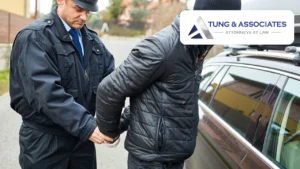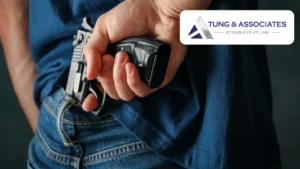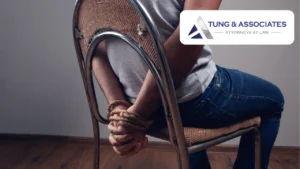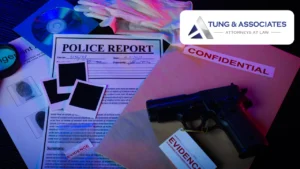Former prosecutor dedicated to defending Pasadenans facing criminal charges. Call today to start your defense.

Home » Pasadena Attempted Murder Lawyer Near Me

Facing an attempted murder charge is overwhelming. The stakes are life-changing because California punishes attempted murder almost as severely as murder itself, and a conviction can mean life in state prison. You need answers and a fearless advocate right now.
We are Pasadena criminal defense attorneys dedicated to protecting your freedom. We have spent more than a decade defending serious felony cases – including attempted murder – through meticulous investigation, strategic negotiation, and aggressive trial work. Many of my clients walk free or see charges reduced because we know how to expose weak evidence and safeguard their rights at every stage.
Our office sits at 790 E. Colorado Blvd., 9th Floor, just minutes from the Pasadena Courthouse, so we can respond fast when the Los Angeles County District Attorney files charges. Call us 24/7 at (626) 416-4668.
Below, we answer the urgent questions most clients ask about attempted murder laws, penalties, and proven defenses – so you can take the next step with confidence.
California law defines attempted murder as trying – but failing – to unlawfully kill another person. Under Penal Code §§ 664/187, prosecutors must prove two things: (1) the defendant specifically intended to kill, and (2) the defendant took a “direct step” toward that goal.
Specific intent to kill matters because it separates attempted murder from assault. If the prosecution cannot show a deliberate aim to end life – such as aiming for vital organs or admitting the desire to kill – the charge can collapse into a lesser offense. Courts routinely dismiss or reduce cases where evidence only shows intent to frighten or injure.
A direct step is more than planning; it is an act that would logically lead to a killing if not interrupted. Pulling a trigger, plunging a knife, or setting an explosive all satisfy this element. Buying a weapon or driving to the scene is usually mere preparation and may not meet the legal threshold.
California’s “kill-zone” theory lets prosecutors file multiple counts when a single act endangers several people. Firing into a crowded Old Pasadena café can yield a separate attempted murder count for every patron within range – even if the bullet hits no one – because the law treats each person in the danger zone as a potential victim.
Attempted murder is classified as a violent felony and a strike under California’s Three-Strikes Law, so penalties approach those for completed murder. Understanding these strict definitions is the first step in crafting a defense that challenges intent or shows no direct step, which is why our attorneys analyze every fact with surgical precision.
Call a Pasadena attempted murder lawyer and stay silent. Anything said to detectives or jail staff will be recorded and can be used in court, so politely invoke your Fifth Amendment right to remain silent after giving basic identification.
Ask for counsel immediately. The moment you request an attorney, questioning must stop; our Pasadena attempted murder attorneys can then shield you from aggressive interrogation and start gathering exonerating evidence before it disappears.
Do not discuss the case on jail phones. Los Angeles County records every call, and casual comments often become prosecution exhibits – waiting to speak with us in a private setting keeps damaging statements out of the file.
Prepare for arraignment within 48 hours at the Pasadena Courthouse on Walnut Street, where bail is set. We work quickly to argue for release or a bail reduction, using clean criminal history, employment ties, and weak evidence to persuade the judge.
Call (626) 416-4668 day or night. Because our office is minutes from the jail and courthouse, we can appear early, secure critical body-cam or surveillance footage, and begin building the defense that may keep you out of prison.
Attempted murder carries sentences that rival completed homicide. First-degree attempted murder – willful, deliberate, and premeditated – brings life in state prison with the possibility of parole and fines up to $10,000. If the target is a peace officer or firefighter, parole is not possible for at least 15 years.
Second-degree attempted murder – anything not premeditated – exposes a person to 5, 7, or 9 years in state prison plus the same fine. Both degrees count as “violent felonies” and add a strike under California’s Three-Strikes Law, doubling future sentences and triggering 25-to-life on a third strike.
Sentence enhancements escalate punishment even further. Using a firearm adds 10 years; firing it adds 20; causing injury with it adds 25-to-life under Penal Code 12022.53. Gang allegations under PC 186.22 tack on 15 years-to-life, and “great bodily injury” findings can add 3–6 years. Prior strikes, victim status, or multiple counts for a “kill-zone” shooting can push exposure well past a normal life expectancy.
Collateral fallout is severe. Convicted felons lose gun rights, face deportation if non-citizens, and must pay victim restitution. A parole board will scrutinize every aspect of prison conduct before release is even considered.
These harsh penalties exist to deter lethal intent, but they also leave room for strategic defense. We work to dismantle enhancements, challenge intent, and negotiate reductions – sometimes turning life sentences into single-digit years or outright dismissals when evidence is weak. Early, aggressive advocacy can make the difference between life behind bars and a second chance.
California punishes the intent to kill almost as severely as the act itself. Lawmakers decided that a failed homicide is usually the result of chance – better medical care, quick police response, or sheer luck – not the offender’s restraint.
Because the defendant demonstrated a willingness to end a life, attempted murder is classified as a violent felony and a strike. Treating it this way protects the public, deters future violence, and gives judges leverage to impose harsh terms – sometimes life with parole – even when no death occurred.
These policies may feel harsh, yet they create room for strategic defense. By challenging evidence of intent or proving an act never moved beyond planning, we can show the offense does not warrant murder-level punishment and push for a far lesser charge.
Attempted murder requires a proven intent to kill plus a direct step toward that goal. Murder adds only one fact – the victim dies – yet penalties soar to life without parole or the death penalty, whereas first-degree attempt is life with parole.
Attempted voluntary manslaughter involves a heat-of-passion intent formed in seconds. Because provocation clouds judgment, it carries up to 5 years 6 months instead of life, making it a prime reduction target when emotions – not planning – drove the act.
Assault with a Deadly Weapon (PC 245) punishes the use of force, not an intent to kill. Typical exposure is 2–4 years (more if a firearm is used), so proving the accused only meant to injure can slash decades off a sentence.
Mayhem (PC 203/205) focuses on intent to maim or disfigure. Aggravated mayhem is serious – life with parole – yet it still requires no intent to kill; sometimes the DA files both charges, giving us leverage to demand dismissal of one.
These distinctions matter because juries, judges, and prosecutors must match charges to facts. We exploit every gap in intent, planning, or injury to push an attempted murder down to a lesser offense – often the difference between freedom and a lifetime behind bars.
One timely conversation with the right lawyer can decide whether an attempted murder charge ends in prison or freedom.
We answer calls 24/7 at (626) 416-4668 because moments after an arrest evidence begins to vanish, witnesses forget details, and prosecutors shape their narrative. By contacting us early, we secure surveillance footage, interview critical witnesses, and file motions that can suppress illegal evidence – often before the District Attorney knows what is missing.
Our office at 790 E. Colorado Blvd., 9th Floor, Pasadena, CA 91101 is steps from the Pasadena Courthouse, letting us appear on your behalf within minutes. Language is never a barrier; our team serves clients in English, Mandarin, and additional languages so every question is answered with clarity and compassion.
Your consultation is confidential. Bring arrest paperwork, bail information, or simply your worries – we will explain realistic outcomes, outline immediate defense steps, and clarify fees in plain language. If you retain us, you gain a defense team that has turned life-sentence cases into outright dismissals and reduced charges to single-digit years.
Don’t let fear or uncertainty delay your defense. Call (626) 416-4668 or fill out our secure online form now. When your future hangs in the balance, our attorneys are ready to fight for you!
Our criminal defense attorneys in Pasadena focus solely on defending the accused

Caught up in a DUI charge? You’re not alone, and this doesn’t have to define your future. Our Pasadena DUI lawyers are here to challenge the evidence, defend your rights, and fight for the best outcome every step of the way.

Felony DUI charges can feel like your world is crashing down. But don’t panic. Our Felony DUI Lawyers in Pasadena know how to thoroughly examine the prosecution’s case and advocate for reduced charges or even dismissal. You’ve got options, and we’ll help you use them.

Charged with assault using a deadly weapon? This is serious, but you don’t have to face it alone. Our Pasadena assault with a deadly weapon lawyers dig deep into every detail of your case to uncover what happened and build a powerful defense on your behalf.

Sometimes things escalate fast, and suddenly you’re facing assault and battery charges. Let our Pasadena assault and battery lawyers step in and bring clarity, strategy, and strong legal defense to your side. We’re ready to stand up for your story.

Being accused of attempted murder is overwhelming, but there’s still time to take control of your future. Our Pasadena attempted murder lawyers have handled high-stakes cases like this before, and we’re ready to challenge every piece of the evidence and defend your freedom.

Domestic violence accusations can damage everything you’ve built. Whether it’s a misunderstanding or a false claim, our Pasadena domestic violence lawyers help protect your rights and fight to preserve your name, your family, and your future.

Drug trafficking charges come with major consequences. But one charge doesn't define you. Our Pasadena drug trafficking lawyers bring bold, strategic defense to every case, challenging the investigation and pushing back hard against the state’s case.

Homicide charges demand serious defense from day one. Our Pasadena homicide lawyers works fast to uncover the facts, protect your rights, and fight for the best possible resolution. When everything’s on the line, we’re the team you want in your corner.

Accused of kidnapping? It’s a charge that can carry massive penalties and lifelong consequences. Our Pasadena kidnapping lawyers are here to cut through the noise, challenge weak claims, and put your side of the story front and center.

Facing a murder charge is terrifying, but always remember that you have the right to a powerful defense. Our Pasadena murder lawyers bring passion, precision, and relentless drive to protect your future and uncover the truth in every case we take on.

Robbery charges can lead to harsh penalties, but a strong defense can make all the difference. Our Pasadena robbery lawyers are ready to dig deep, find the facts, and fight to protect your freedom and your future.
Tung & Associates Los Angeles Criminal Defense Attorney
445 S Figueroa St, Los Angeles, CA 90071
Phone:(626) 416-4668
Tung & Associates Los Angeles Criminal Defense Attorney
Address: 445 S Figueroa St, Los Angeles, CA 90071
Phone Number: (626) 416-4668
Email: info@tunglaw.com
Office Hours:
Monday : 9 AM – 6 PM
Tuesday : 9 AM – 6 PM
Wednesday 9 AM – 6 PM
Thursday : 9 AM – 6 PM
Friday : 9 AM – 6 PM
Saturday : Closed
Sunday : Closed
© 2025 Tung & Associates. All Rights Reserved.